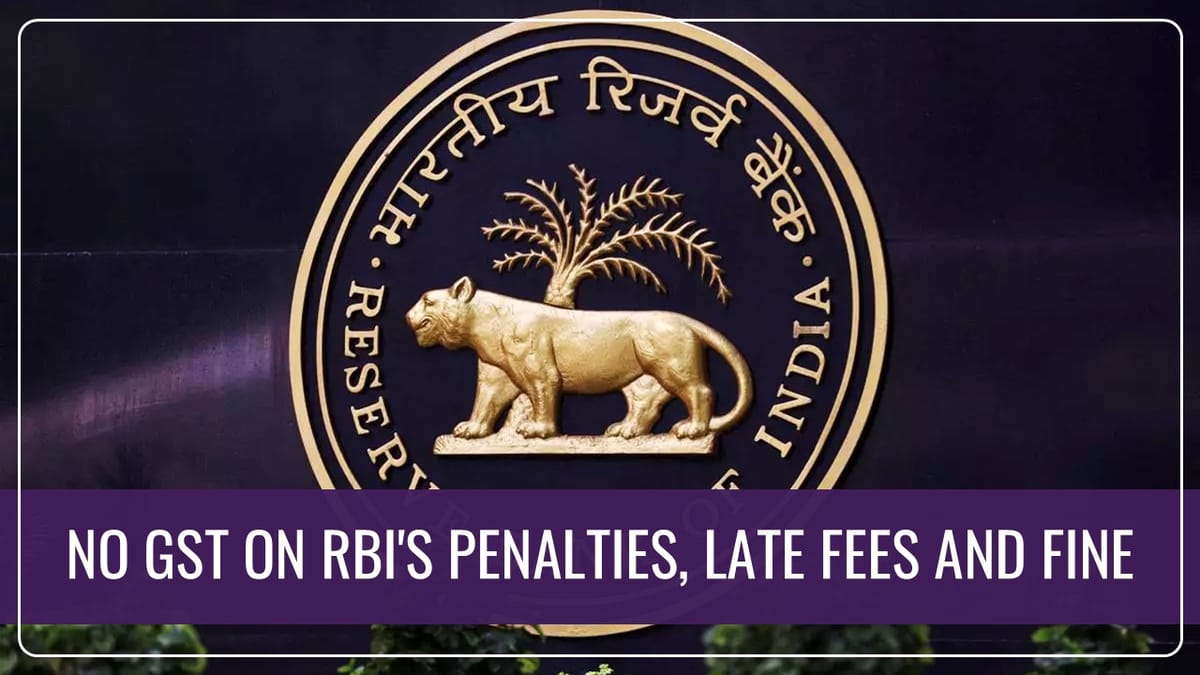Maharashtra's Authority for Advance Rulings has announced that the RBI will not be obliged to register GST on fines and penalties collected from its controlled institutions.
Reetu | Aug 28, 2024 |

No GST on RBI’s Penalties, Late Fees and Fines; Says Maharashtra AAR
The Authority for Advance Rulings of Maharashtra (MAAR) has announced that the Reserve Bank of India will not be obliged to register GST on fines and penalties collected from its controlled institutions.
The RBI has approached MAAR for advance rulings on two questions: first, whether penalties, late fees, and penal interest of the nature levied and collected for infringement or breach of law are taxed under GST, and second, whether penalties of the nature for non-performance or underperformance under the RBI’s contractual agreement with third-party vendors are taxed under GST.
The Central Bank drew attention to a 2017 circular, which stated that “penalties imposed for violation of laws cannot be regarded as consideration charged by the government or a local authority for tolerating violence against laws.”
It stated that laws are not being enacted to condone their violations. They stipulate a penalty for failing to accept violations, but not for condoning, penalizing, or discouraging such breaches.
The circular stated that “There is no agreement between the government and the violator specifying that the violation would be allowed or permitted against payment of a fine or penalty. There cannot be such an agreement because violating the law is never a lawful goal or consideration.”
The RBI has stated that the CBIC’s view is clear and that fines imposed by the RBI are equivalent to penalties, late fees/penal interest, and fines assessed under various acts such as the GST Act or the Income Tax Act.
The RBI, as a legal authority overseeing several acts, imposes penalties, late fees/penal interest, and fines arising from such legal statutes.
Hence “the penalties are akin to penalties arising out of other such acts.” Thus, the penalties levied by the RBI could not be construed as consideration or collection for any outward supply, it stated.
The RBI emphasized that the main reason for imposing penalties, late fees/penal interest, and fines are to instill discipline among regulators, as it serves as a deterrent.
Based on the jurisdictional officer’s submission, payments in the form of penalties, late fees and interest levied and collected by the RBI for violations of regulations or insufficient performance under contracts with external vendors are not considered taxable income because they do not represent payment for a supply.
After examining all of the arguments and evidence, the AAR concluded that the sanctions imposed by the RBI for noncompliance with the legislation it supervises are meant to foster discipline and deterrence in regulated banks, non-banking financial institutions, and other organizations.
According to the ruling, these activities are not considered an activity and hence represent a supply of services.
Indeed, the penalties are similar to the liquidated damages imposed by the RBI on third-party vendors for nonperformance or underperformance under the contract. Such operations do not constitute a supply. According to that, the act does not impose GST.
In case of any Doubt regarding Membership you can mail us at [email protected]
Join Studycafe's WhatsApp Group or Telegram Channel for Latest Updates on Government Job, Sarkari Naukri, Private Jobs, Income Tax, GST, Companies Act, Judgements and CA, CS, ICWA, and MUCH MORE!"